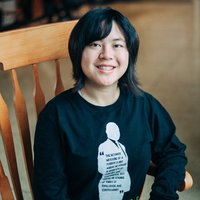Natalie Wu
Item
-
Title
-
Natalie Wu
-
Description
-
How would you describe your immigrant background and values?
“My grandpa was actually brought to Taiwan as a refugee during the 1949 revolution. He was one of the first waves to flee there and he basically never saw his family again. But he still has a very positive outlook on life despite everything that’s happened. My mom’s story probably has more impact because she grew up really poor in China during the cultural revolution. She told me about education, because that was the main reason she wanted to come here. She remembered how when they were young, they had to hide and burn any books that were Western books. And she saw my grandpa get sent to re-education for three to four years because he was a high school teacher. So for her, there was a huge focus on education. She was able to get out because she studied really hard and she was one of the top students in the region. She said when the U.S. opened up, they only allowed the cream of the crop to come in. So she knew she had to work her way up there to get to come here. I guess that’s been a big part, just the idea of being able to have a good future with education. I’ve always had really good access to education with tutoring and going to a good public school. My mom had to struggle so much, and wasn’t even able to go to school because of the political stuff happening in China. That has really played a role. And as much as we suffer at Hopkins, it does remind you that there is a reason why you are here and this is a privilege and it’s not something that you should take for granted.”
How would you describe your parents’ process of adapting to the United States?
“I would say my dad embraced it [the United States] immediately. For my mom, it was more of a process over time. There were certain things that drew her over here, like the freedom of speech and assembly, because she was involved with some student protesting in Canton Province before Tiananmen Square happened. That kind of political freedom - she really embraced it. Some other softer cultural things took some more time, and it was definitely a slower process than my dad’s. A lot of it, I think now, has had to do with me and growing up. I was pretty close to her, and from high school onwards, there have been a lot of cultural things and social issues that you normally wouldn’t talk about. Her views have really been impacted by how I view these issues. She’s pretty progressive when it comes to social issues like LGBTQ rights. I think most of my friends are not really comfortable talking about that kind of stuff, but I’m pretty comfortable talking about it with my mom and we have open conversations about that and other social issues. Even things like sexual harassment on college campuses. In the past few years, she has become a lot more Westernized and that has a lot to do with me. I think part of it is that she sees how traditional my best friend’s mom is - they don’t have a really great relationship. They care about each other, but they don’t really talk to each other or have the same type of interactions. And for my mom, I think that’s a big thing - her wanting to understand…to culturally connect. I would say she has still retained certain senses that are traditional, but on certain things, she’s more open to new ideas because she wants to understand me. And because I’ve grown up as an American, she wants to understand what’s going on in my head. She wants to be able to talk about issues, so there’s never anything we
can’t talk about.”
- Natalie Wu
 Natalie Wu
Natalie Wu